英语中的省略句
英语中几种常用省略的用法总结

英语中几种常用省略的用法总结省略在英语语言的应用非常广泛,其中有很多常用的省略用法。
下面总结一下以往常见的一些省略形式:一、表示未表达完整的缩写1、单字缩写。
如: is,>’s; has,>’s; have,>’ve;I,>I’m; he,>he’s; she,>she’s; do,>do’s;does,>does’s; am,>am’s2、多字缩写。
如:are not,>aren’t; cannot,>can’t; do not,>don’t; will not,>won’t; have not,>haven’t; would not,>wouldn’t; could not,>couldn’t; shouldnot,>shouldn’t; it is,>it’s; that is,>that’s; there is,>there’s二、表示不完整词组的省略1、定语从句中的省略。
如:(1) All the students (who are) present here are eager to study.(2) This is the reason (why) he decided to quit his job.2、表示概念的省略。
如:(1) TV and radio (programmes).(2) To do more exercise (is beneficial to your health).三、表示句子成分的省略1、宾语的省略。
如:(1) I like to read (books).(2) He gave me an answer (to my question).2、表语的省略。
如:(1) He is a teacher (of English).(2) The weather today is (very) hot.3、主语的省略。
省略句高考英语
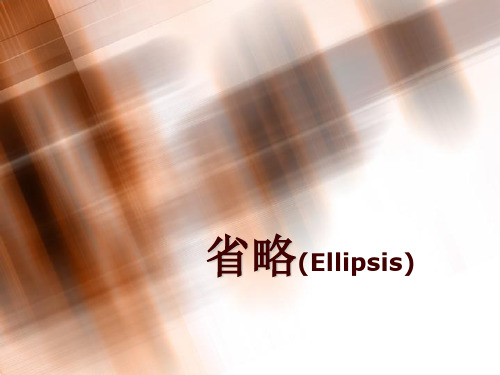
--- You should have thanked her before you left. --- I meant ________, but when I was leaving I couldn't find her anywhere. A. to do B. to B C. doing D. doing it
8
四 状语从句中的省略 1)当状语从句中的主语和主句的主语一致,或状 语从句中的主语是it,并且又含有be动词时,常 可以省略从句中的主语和be动词:
9
> He did as (he was) told. > Though (they were) tired, they went on working. > You shouldn't come to his party unless (you are) invited. > He paused as if (he was) expecting her to speak. > When (it is) necessary, I will turn to you for help.
11
2. Generally speaking, ________according to directions, the drug has no side effect. A. when taking B. B when taken C. when to take D. when to be taken
省略(Ellipsis)
省略(Ellipsis)
作用:
>避免结构上或内容上的重复,使上下文紧
密连接;
>语法的客观要求,句子中的一个或几个成
英语省略句总结
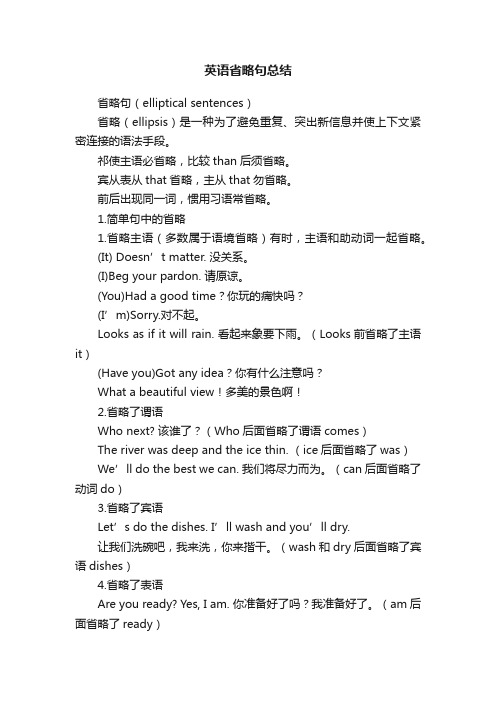
英语省略句总结省略句(elliptical sentences)省略(ellipsis)是一种为了避免重复、突出新信息并使上下文紧密连接的语法手段。
祁使主语必省略,比较than后须省略。
宾从表从that省略,主从that勿省略。
前后出现同一词,惯用习语常省略。
1.简单句中的省略1.省略主语(多数属于语境省略)有时,主语和助动词一起省略。
(It) Doesn’t matter. 没关系。
(I)Beg your pardon. 请原谅。
(You)Had a good time?你玩的痛快吗?(I’m)Sorry.对不起。
Looks as if it will rain. 看起来象要下雨。
(Looks前省略了主语it)(Have you)Got any idea?你有什么注意吗?What a beautiful view!多美的景色啊!2.省略了谓语Who next? 该谁了?(Who后面省略了谓语comes)The river was deep and the ice thin. (ice后面省略了was)We’ll do the best we can. 我们将尽力而为。
(can后面省略了动词do)3.省略了宾语Let’s do the dishes. I’ll wash and you’ll dry.让我们洗碗吧,我来洗,你来揩干。
(wash和dry后面省略了宾语dishes)4.省略了表语Are you ready? Yes, I am. 你准备好了吗?我准备好了。
(am后面省略了ready)He was a lover of sports as he had been in his youth.他还是象年轻时那样,是一位运动爱好者。
(had been后面省略了a lover of sports)5.省略了状语He was not hurt. Strange! 他没有受伤,真奇怪!(Strange前面省略了状语how)6.同时省掉句子几个成份。
中考英语省略句的归纳总结
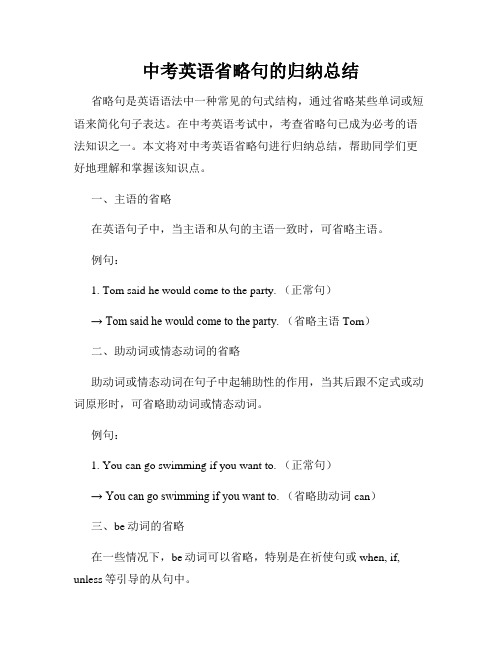
中考英语省略句的归纳总结省略句是英语语法中一种常见的句式结构,通过省略某些单词或短语来简化句子表达。
在中考英语考试中,考查省略句已成为必考的语法知识之一。
本文将对中考英语省略句进行归纳总结,帮助同学们更好地理解和掌握该知识点。
一、主语的省略在英语句子中,当主语和从句的主语一致时,可省略主语。
例句:1. Tom said he would come to the party. (正常句)→ Tom said he would come to the party. (省略主语Tom)二、助动词或情态动词的省略助动词或情态动词在句子中起辅助性的作用,当其后跟不定式或动词原形时,可省略助动词或情态动词。
例句:1. You can go swimming if you want to. (正常句)→ You can go swimming if you want to. (省略助动词can)三、be动词的省略在一些情况下,be动词可以省略,特别是在祈使句或when, if, unless等引导的从句中。
例句:1. Be quiet and listen to the teacher. (正常句)→ Be quiet and listen to the teacher. (省略be动词)四、状语的省略当主句和从句之间的时间状语、地点状语、方式状语等相同或相似时,可将其在从句中省略。
例句:1. He lives in Beijing and I live in Beijing. (正常句)→ He lives in Beijing and I do too. (省略相同的地点状语in Beijing)五、连接词的省略在句子中,连接词如and, but, or等可以省略,特别是在并列句中。
例句:1. She is tall and she is thin. (正常句)→ She is tall and thin. (省略连接词and)六、祈使句中的省略在祈使句(祈使句用于表达命令、请求、劝告等)中,主语you可以省略。
高中英语语法-省略句
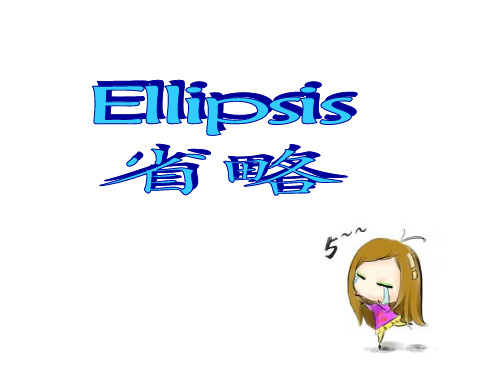
: Unlesshhee is invited, he won’t come.
: Unlesshe is invited, he won’t come. : Whilehhee is doing house work, my father often listens to music. : While he is doing house work, my father often listens to music.
2、省略主谓或主谓语的一部分。如:
(省略主语和谓语)
: What/How (do you think) about a cup of tea ? : Why (do you) not say hello to him ?
3、省略表语。
: –Are you thirsty? – Yes, I am(.thirsty). : His brother isn’t lazy, nor is his sister(.lazy).
※介词的省略※(考点)
1. 一些常和动名词、形容词一起搭配的介词常省 略,而保留其后的 动名词,常见的句型有
spend/waste time (in) doing, lose no time (in) doing; have difficult/trouble (in) doing; be busy (in) doing; stop/prevent sb. (from) doing 等。
: The order that we(sshhoouuldld) stay where we are is very serious and severe.
: It’s very important that students(shshoouuldld) study hard at school.
(完整版)英语省略句的六大总结

英语中的六大省略现象概念:为了避免重复,省略句中的一个或几个句子成分,这种语法现象称为省略。
1. 简单句中的省略现象例:(1)在对话中,例如:—How is your mother today? 你妈妈今天怎样?—(She is) Much better. (她)好多了。
(2)在祈使句中,例如:(You) Open the door, please! 请开门!(3)在感叹句中,例如:What a (good) boy (he is)! 多好的男孩啊!How (hard) they are working! 他们工作得多努力呀!(4)表示讲话人的意见和看法,上下文意思很清楚,例如:(It) sounds fine to me.(It's a) pity you couldn't come. 你不能来,真遗憾。
(5)提问,例如:(Is there) anything wrong? 发生了什么事吗?(Have you) found the treasure? 你已经找到珠宝了吗?(6)名词所有格修饰的名词若表示店铺、住宅、教堂或上下文已暗示或明确指出过的事物。
例如:at her mother's (house) 在她妈妈家里at the doctor's (house) 在医院里at the barber's (shop) 在理发店里at the tailor's (shop) 在裁缝店里(7)动词不定式的省略。
前面出现过的动词在下文再次出现时,可以单纯使用不定式符号to。
动词不定式的省略,一般只省略动词,而保留符号“to”。
例如:—Will you go with me? 你愿意跟我一块去吗?—Well, I'd like to(go with you). 我非常愿意。
I'd like to.也可用I'd love to. /I'd be happy to. 来取代。
【英语知识点】英语省略句语法总结及例句

【英语知识点】英语省略句语法总结及例句英语中的省略是为了避免重复、突出新信息并使上下文紧密连接的一种语法修辞手段。
省略在英语语言中,尤其在对话中,是一种十分普遍的现象。
省略句是英语的一种习惯用法。
1.省略介词:I've studied English (for) five years.我已学五年英语了。
2.省略连词that:I believe (that) you will succeed.我相信你们会成功的。
3.省略关系代词:I'll give you all (that) I have.我要把我所有的一切都给你。
1.省略主语:(You) Open the door,please.请开一下门。
2.省略谓语:Who (es) next?该谁了?3.省略主谓语或主谓语的一部分:(There is) No smoking.禁止抽烟。
4.省略表语:Are you thirsty ? 你30岁了吗?Yes,I am (thirsty).是的,我是。
5.省略宾语:Let's do the dishes. I'll wash and you'll dry(dishes). 让我们洗碗吧,我来洗,你来揩干。
6.省略状语:He was not hurt. (how)Strange! 他没有受伤,真奇怪!7.同时省略几个成分:(I wish) Good luck (to you) .祝你好运/祝你顺利。
1.为避免重复而进行的省略。
当一个句子中有两个或更多相同的词、短语出现时,其中的第一个须保留,其余的往往省略,以达到避免重复、使句子简练的目的。
高考中尤其要注意的情况是:当时间状语从句、地点状语从句、方式状语从句、让步状语从句、条件状语从句等状语从句中的主语与主句的主语一致并含有be时,往往将该状语从句中的主语和be一同省略。
2.语法上的省略。
有些成分的省略是出于语法上的原因——使表述更为简明,例如:He got up at six (o’clock).他六点钟起床。
省略句(英语)

定义:为了避免重复,省略句中的一个或 几个成分,这种语法现象称为“省略”。
英语中省略现象较为普遍,对省略的考查已成 为高考中的热点。句子成分的省略,可分为以下 7种情况:
1.省略主语,主谓语或主谓的一部分 2.不定式符号to的省略 3.不定式结构中动词的省略 4.状语从句中的省略 5.定语从句中关系词的省略 6.虚拟语气中if和should的省略 7.not, so, neither, nor 的“替代性”省略
3. Sounds like a good idea. (It) sounds like a good idea. 4. Anything I can do for you? (Is there) anything I can do for you?Βιβλιοθήκη 省略主语,主谓语或主谓的一部分
(1) (I) Beg your pardon. 省略主语 (2) (It) Sounds like a good idea. (1) (Is) Anybody here? (2) (Is there) Anything I can do 省略谓语或谓 语的一部分 for you?
简单句中的省略
1、省略主语 祈使句中主语通常省略;其 它省略主语多限于少数现成的说法。 (1) (I) See you tomorrow.
(2) (It) Doesn’t matter.
2、省略主谓或主谓语的一部分 (1) (There is) No smoking .
(2) (Will you) Have a smoke ?
(1) (Are you) Hungry? (2) (I want) Orange juice, please.
省略主语 和谓语
英语省略大全(初高中皆可用)

省略大全英语中几种常用“省略”的用法总结省略句的概念英语中,为了避免重复,常常省略句子中的一个或几个成分,这样的句子叫省略句。
一、简单句中的省略在对话中,交谈双方都知道谈论的对象,则可以省略句子的主语,省略主语和谓语的现象在交际用语中出现的很多。
1. 省略主语1)祈使句中的主语通常被省略如:(You) Open the door,please.请开一下门。
2) 其它省略主语多限于现成的说法如:a) (I) Thank you for your help. 谢谢你的帮助。
b) (It )Doesn’t matter.没关系。
2. 省略主谓语或主谓语的一部分a) (There is) No smoking. 禁止抽烟。
b) (Is there)anything else ? 还有其他事吗?c) (You come)This way please.请这边走。
d) (Will you) Have a smoke ? 抽烟吗?3. 省略宾语—Do you know Mr. Li ? 你认识李先生吗?— I don’t know (him) . 我不认识他。
4. 省略表语—Are you thirsty ? 你30岁了吗?Yes , I am (thirsty). 是的,我是。
5. 同时省略几个成分—Are you feeling better now? 你觉得好些了吗?—(I am feeling ) Much better(now) 好多了。
(I wish) Good luck (to you) .祝你好运/祝你顺利。
二、并列复合句中的省略在并列句中后边的分句可以省略与前边分句中相同的成分。
如:a) The boy picked up a coin in the roadand (the boy ) handed it to a policeman.这个男孩在马路上拾起一枚硬币并把他交给了警察。
b) Your advice made me happy but(your advice made) Tom angry .你的建议使我高兴但使汤姆生气。
完整版英语省略句的六大总结

完整版英语省略句的六大总结
1.主语省略:当主语已经被上下文所明确时,可以省略主语。
例句:(原句)I am going to the bookstore.
(省略) Going to the bookstore.
2.谓语动词省略:当谓语动词已经被上下文所明确时,可以省略谓语动词。
例句:(原句)She can play tennis very well.
(省略) She can play very well.
3.宾语省略:当上下文中已明确了宾语时,可以省略宾语。
例句:(原句) Would you like to have some watermelon?
(省略) Would you like some?
4.介词省略:当介词与其宾语紧密相连,且已明确时,可以省略介词。
例句:(原句) We are waiting for you in the park.
(省略) We are waiting for you the park.
5.主语从句省略:当主语从句中的主语与句子的主语相同,可
以省略主语从句。
例句:(原句) That he could swim surprised me.
(省略) To swim surprised me.
6.定语从句省略:当定语从句中的关系代词为主语时,可以省略关系代词。
例句:(原句) The book that I borrowed from the library is very interesting.
(省略) The book I borrowed from the library is very interesting.。
高考英语省略句
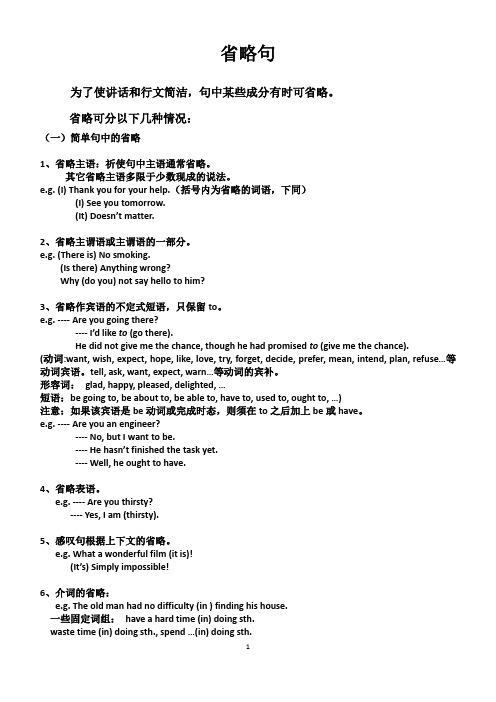
省略句为了使讲话和行文简洁,句中某些成分有时可省略。
省略可分以下几种情况:(一)简单句中的省略1、省略主语:祈使句中主语通常省略。
其它省略主语多限于少数现成的说法。
e.g. (I) Thank you for your help.(括号内为省略的词语,下同)(I) See you tomorrow.(It) Doesn’t matter.2、省略主谓语或主谓语的一部分。
e.g. (There is) No smoking.(Is there) Anything wrong?Why (do you) not say hello to him?3、省略作宾语的不定式短语,只保留to。
e.g. ---- Are you going there?---- I’d like to (go there).He did not give me the chance, though he had promised to (give me the chance).(动词:want, wish, expect, hope, like, love, try, forget, decide,prefer, mean, intend, plan, refuse…等动词宾语。
tell, ask, want, expect, warn…等动词的宾补。
形容词:glad, happy, pleased, delighted, …短语:be going to, be about to, be able to, have to, u sed to, ought to, …)注意:如果该宾语是be动词或完成时态,则须在to之后加上be或have。
e.g. ---- Are you an engineer?---- No, but I want to be.---- He hasn’t finished the task yet.---- Well, he ought to have.4、省略表语。
省略句的常见形式与解析
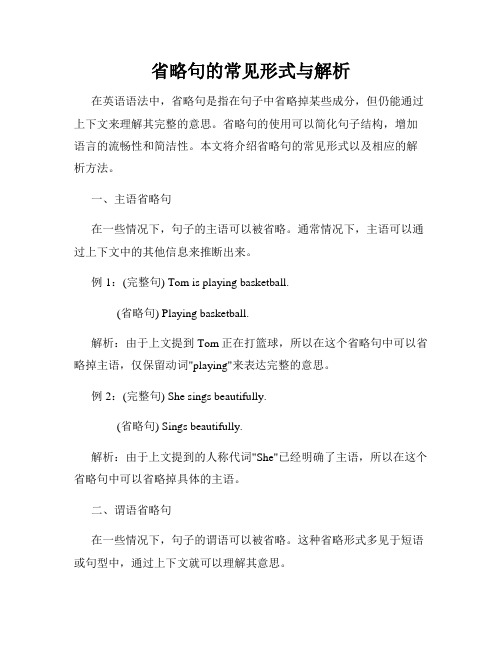
省略句的常见形式与解析在英语语法中,省略句是指在句子中省略掉某些成分,但仍能通过上下文来理解其完整的意思。
省略句的使用可以简化句子结构,增加语言的流畅性和简洁性。
本文将介绍省略句的常见形式以及相应的解析方法。
一、主语省略句在一些情况下,句子的主语可以被省略。
通常情况下,主语可以通过上下文中的其他信息来推断出来。
例1:(完整句) Tom is playing basketball.(省略句) Playing basketball.解析:由于上文提到Tom正在打篮球,所以在这个省略句中可以省略掉主语,仅保留动词"playing"来表达完整的意思。
例2:(完整句) She sings beautifully.(省略句) Sings beautifully.解析:由于上文提到的人称代词"She"已经明确了主语,所以在这个省略句中可以省略掉具体的主语。
二、谓语省略句在一些情况下,句子的谓语可以被省略。
这种省略形式多见于短语或句型中,通过上下文就可以理解其意思。
例1:(完整句) He can play the guitar, but I can't.(省略句) He can play the guitar, but I can't play (the guitar).解析:在这个省略句中,通过上文提到的主题"play the guitar",可以省略掉谓语"Not",而保留上文中的句意。
例2:(完整句) John lives in New York, and Mary in Los Angeles.(省略句) John lives in New York, and Mary in Los Angeles.解析:在这个省略句中,由于谓语"lives"已经在上文中出现过,因此可以省略掉后面的谓语,仅根据上下文理解出Mary的具体情况。
英语省略句的几种形式

英语省略句的几种形式
英语省略句的几种形式
(一)省略主语。
如,
She went to the hospital and (she) saw a doctor.
她去医院看了医生。
(二)省略整个谓语或谓语的主要部分。
如,
Either T om must be responsible for the matter or we will be (responsible for the matter).
汤姆必须对此事负责,否则我们将(对此事负责)。
(三)省略谓语中的助动词。
如,
Was Jack playing the guitar and (was) Alice preparing the supper?
杰克在弹吉他,爱丽丝在准备晚饭吗?
(四)省略谓语中主要动词。
如,
Albert needn't stay, but George must (stay).
艾伯特不必留下来,但乔治必须留下来。
(五)省略宾语。
如,
John likes smoking, but Mary hates (smoking).
约翰喜欢抽烟,但玛丽讨厌抽烟。
英语中的省略句
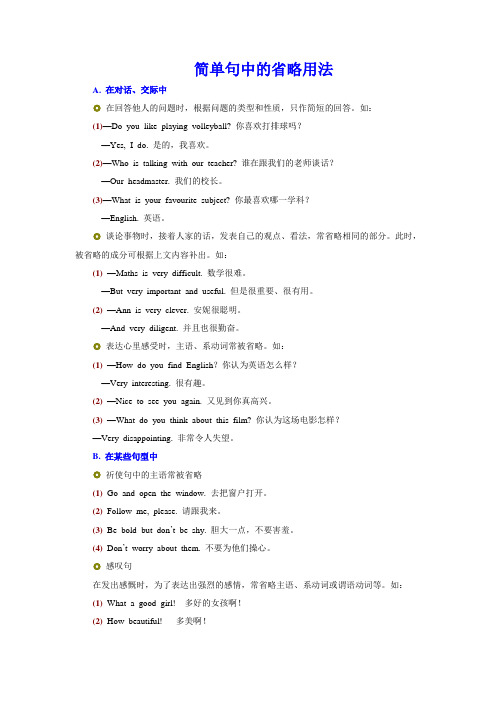
A. 在对话、交际中◎在回答他人的问题时,根据问题的类型和性质,只作简短的回答。
如:(1)—Do you like playing volleyball? 你喜欢打排球吗?—Yes, I do. 是的,我喜欢。
(2)—Who is talking with our teacher? 谁在跟我们的老师谈话?—Our headmaster. 我们的校长。
(3)—What is your favourite subject? 你最喜欢哪一学科?—English. 英语。
◎谈论事物时,接着人家的话,发表自己的观点、看法,常省略相同的部分。
此时,被省略的成分可根据上文内容补出。
如:(1)—Maths is very difficult. 数学很难。
—But very important and useful. 但是很重要、很有用。
(2)—Ann is very clever. 安妮很聪明。
—And very diligent. 并且也很勤奋。
◎表达心里感受时,主语、系动词常被省略。
如:(1)—How do you find English?你认为英语怎么样?—Very interesting. 很有趣。
(2)—Nice to see you again. 又见到你真高兴。
(3)—What do you think about this film? 你认为这场电影怎样?—Very disappointing. 非常令人失望。
B. 在某些句型中◎祈使句中的主语常被省略(1)Go and open the window. 去把窗户打开。
(2)Follow me, please. 请跟我来。
(3)Be bold but don’t be shy. 胆大一点,不要害羞。
(4)Don’t worry about them. 不要为他们操心。
◎感叹句在发出感慨时,为了表达出强烈的感情,常省略主语、系动词或谓语动词等。
如:(1)What a good girl! 多好的女孩啊!(2)How beautiful! 多美啊!一、在对话、交谈中1.回答问题时,往往可省略从句或主句中的某些成分、甚至整个从句或主句。
英语高考课件省略句

并列句中的省略
两个并列句中,后一个分句常省略与前一分句中 相同的部分。 (1) My father is a doctor and my mother (is) a nurse.
(2) I study at college and my sister (studies) at high school.
高考英语课件省略句
省略句
▼基本概念
省略句的定义:
省略句是为了避免重复、突出新信息 并使上下文紧密连接的一种语法修辞手段。 省略在语言中,尤其在对话中,是一种十 分普遍的现象。
简单句的省略
1、省略主语 祈使句中主语通常省略;其它省略主语
多限于少数现成的说法。
(1) (I) Thank you for your help. (2) (I) See you tomorrow. (3) (It) Doesn’t matter. (4) (I) Beg your pardon.
简单句的省略 4、省略表语 (1) –Are you thirsty --Yes, I am (thirsty). (2) His brother isn’t lazy, nor is his sister (lazy).
5、同时省略几个成分 (1) Let’s meet at the same place as (we met) yesterday. (2) –-Have you finished your work
6)-----I won’t do it any more. -----_______ A. Why not B. Why don’t do any more C. Why not do D. Why don’t
英语省略句集锦

省略句一. 概念英语中,为了避免重复,常常省略句子中的一个或几个成分,这样的句子叫省略句二.相关知识点精讲1. 简单句中的省略:在对话中,交谈双方都知道谈论的对象,则可以省略句子的主语,省略主语和谓语的现象在交际用语中出现的很多。
(1)Looks like rain.(2)Hope to hear from you soon.(3)Sounds like a good idea.(4)Beg your pardon.(5)Feeling better today ?(6)This way, please.(7)—What does he want to eat ?—Some rice and vegetables.(8)Anything I can do for you ?(9)Sorry to hear that.(10)Doesn’t matter.(11)Terrible weather!(12)Pity you couldn’t come.2. 并列句中的省略:在并列句中,相同的成分如主语,谓语,宾语等都可以省略:(1)They learn French and we English.(2)My father planned and built all these houses.(3)John won the first race and Jimmy the second.(4)Coral is not a plant but a variety of animal life.3. 复合句中的省略:定语从句:(1)That’s the reason he is late for the conference.(2)I don’t like the way he talks.状语从句:(1)If heated, water will boil.(2)Tom was attacked by cramp while swimming across the river.(3)We’ll go to help you if necessary.(4)Had I time, I would come.(5)I’ll go, should it be necessary.(6)The captain can find a boat quicker than we can.宾语从句:如果宾语从句中的谓语部分与主句的谓语部分或上文的谓语部分相同,可将从句部分的谓语省略。
英语中的省略句和省略句的规则

英语中的省略句是一种特殊的句型,通过省略部分句子成分,使句子更加简洁、流畅。
省略句的使用可以提高句子表达的效果,但也需要注意一些规则。
在英语中,常见的省略句有主语、谓语、宾语和其他成分的省略。
以下是一些常见的省略句规则:1.主语的省略当主语已经在上下文中明确指出时,可以省略主语。
例如:•Who is the winner? (Who: 主语)•Tom is. (Tom: 主语)2.谓语的省略当句子中的谓语动词与上文中的主谓一致时,可以省略谓语动词。
例如:•Have you finished your homework? (Have you: 谓语动词)•Yes, I have. (I have: 谓语动词)3.宾语的省略当宾语是不定式短语、动名词短语或从句时,有时可以省略宾语。
例如:•I want to eat some ice cream. (to eat some ice cream: 宾语)•I want to. (to: 宾语)•She enjoys swimming in the summer. (swimming in the summer: 宾语)•She enjoys it. (it: 宾语)4.其他成分的省略有些介词短语或副词短语在语境中已经明确,可以省略。
例如:•Peter is going to the supermarket. (to the supermarket: 介词短语)•So is Mary. (So: 其他成分)•He said he would visit us tomorrow. (tomorrow: 副词短语)•He said he would. (He: 其他成分)正如以上所述,省略句是一种简化语句结构的技巧,使句子更加简洁。
然而,省略句也有一些注意事项。
首先,省略句要根据上下文进行判断。
如果没有足够的上下文信息,可能会造成误解。
其次,省略句需要遵守语法规则。
(完整版)英语省略句的六大总结

英语中的六大省略现象概念:为了避免重复,省略句中的一个或几个句子成分,这种语法现象称为省略1. 简单句中的省略现象(6)名词所有格修饰的名词若表示店铺、 住宅、 教堂或上下文已暗示或明确指出过 的事物。
例如:例:( 1)在对话中,例如:— How is your mother today?— (She is) Much better.(2) 在祈使句中,例如: (You) Open the door, please!(3) 在感叹句中,例如: What a (good) boy (he is)! How (hard) they are working!( 4)表示讲话人的意见和看法, (It) sounds fine to me.(It's a) pity you couldn't come.(5)提问,例如: (Is there) anything wrong? (Have you)found the treasure? 你妈妈今天怎样? 她)好多了。
请开门!多好的男孩啊!他们工作得多努力呀!上下文意思很清楚,例如:你不能来,真遗憾。
发生了什么事吗?你已经找到珠宝了吗? at her mother's (house)在她妈妈家里 at the doctor's (house)在医院里 at the barber's (shop)在理发店里 at the tailor's (shop) 在裁缝店里(7)动词不定式的省略。
式符号 前面出现过的动词在下文再次出现时, to 。
动词不定式的省略,一般只省略动词,而保留符号“ 可以单纯使用不定 to ”。
例如:—Will you go with me? 你愿意跟我一块去吗?—Well, I'd like to(go with you). 我非常愿意。
I'd like to. 也可用I'd love to. /I'd be happy to. 来取代。
英语省略句

高考英语考点-省略句省略句是高考考查的语法重点,又是学习的难点。
在英语中,为了使句子简洁明快,突出重点,常用"省略句",只要不影响句意的表达,能省略的成分尽可能省略。
省略现象随处可见,大致可分为以下几种情况。
一、句子成分的省略1. 省略主语。
如:Haven't seen you for ages!好久不见了!2.省略谓语。
如:(Is there) Anything you want? 你要什么东西吗?(Does) Anybody need help? 有人要帮忙吗?3. 省略宾语。
如:I don't know (where he is ). 我不知道。
4.省略主语和谓语(或谓语的一部分),只剩下表语、宾语、状语或其它成分。
如:(I'm) Afraid I can't come. 恐怕我不能来了。
(Have you) Got any ink? 你有墨水吗?【高考链接】-It’s a long time since I saw my sister.(2007全国卷1)-_________her this weekend?A. W hy not visitB. Why not to visitC. Why not visitingD. Why don’t visit解析:答案为A。
本题考察省略结构,这里why not visit =Why didn’t you visit ,这种既注重基础又兼顾生活交际的试题,其实多数学生感觉很容易能得出正确的A答案。
二、复合句的省略1.在含有状语从句的复合句中由when,while,as, once,whenever引导的时间状语从句;或由if,unless引导的条件状语从句;由though,although,even if ,even though引导的让步状语从句;由as though,as if,as引导的方式状语从句;由because引导的原因状语从句;由wherever引导的地点状语从句,若从句的主句是it或与主句的主语相同,且在谓语中含有be时,常省略从句的主语和be。
- 1、下载文档前请自行甄别文档内容的完整性,平台不提供额外的编辑、内容补充、找答案等附加服务。
- 2、"仅部分预览"的文档,不可在线预览部分如存在完整性等问题,可反馈申请退款(可完整预览的文档不适用该条件!)。
- 3、如文档侵犯您的权益,请联系客服反馈,我们会尽快为您处理(人工客服工作时间:9:00-18:30)。
简单句中的省略用法?A. 在对话、交际中◎在回答他人的问题时,根据问题的类型和性质,只作简短的回答。
如:(1)—Do you like playing volleyball? 你喜欢打排球吗?—Yes, I do. 是的,我喜欢。
(2)—Who is talking with our teacher? 谁在跟我们的老师谈话?—Our headmaster. 我们的校长。
(3)—What is your favourite subject? 你最喜欢哪一学科?—English. 英语。
◎谈论事物时,接着人家的话,发表自己的观点、看法,常省略相同的部分。
此时,被的成分可根据上文内容补出。
如:(1)—Maths is very difficult. 数学很难。
—But very important and useful. 但是很重要、很有用。
(2)—Ann is very clever. 安妮很聪明。
—And very diligent. 并且也很勤奋。
◎表达心里感受时,主语、系动词常被省略。
如:(1)—How do you find English?你认为英语怎么样?—Very interesting. 很有趣。
(2)—Nice to see you again. 又见到你真高兴。
(3)—What do you think about this film? 你认为这场电影怎样?—Very disappointing. 非常令人失望。
B. 在某些句型中◎中的主语常(1)Go and open the window. 去把窗户打开。
(2)Follow me, please. 请跟我来。
(3)Be bold but don’t be shy. 胆大一点,不要害羞。
(4)Don’t worry about them. 不要为他们操心。
◎感叹句在发出感慨时,为了表达出强烈的感情,常、系动词或谓语动词等。
如:(1)What a good girl! 多好的女孩啊!(2)How beautiful! 多美啊!复合句中的省略用法?一、在对话、交谈中1.回答问题时,往往可省略从句或主句中的某些成分、甚至整个从句或主句。
如:(1)—Where were you when the fire broke out last night? 昨天晚上发生火灾时,你在哪?—(I was ) In Li Lei’s. 在李蕾家。
(2)—What will you do when you finish your homework? 你做完作业后干什么?—I’ll go to play football with some friends. 我去跟朋友踢足球。
(3)—What are you going to be when you grow up? 你长大后打算干什么?—I’m going to be a businessman. 我打算去做生意。
2.提出建议、劝告、警告或许诺等时,也可句子中的某些成分。
如:(1)Work harder, and you’ll succeed. 工作再努力些,你就会成功。
(2)Take care when you walk on the ice. 在冰上行走时要小心。
(3)Hurry up, or you’ll be late. 快一点,不然就会迟到了。
?二、某些句型中1.表示时间、条件、让步、方式等状语从句中,如果从句的主语跟主句的主语一致或从句的主语是it,而谓语动词是系动词be时,就可将从句的主语及系动词be 。
如:(1)Solid can be turned into liquid and liquid into gas if heated enough. =solid can be turned into liquid and liquid can be turned into gas if it is heated enough. 如果加到足够的热,固体会变成液体,而液体又会变成气体。
(2)Have a little more if delicious. =You have a little more if it is delicious 如果好吃就多吃一点。
(3)Make changes where necessary. =You make changes where it is necessary. 在必要的地方作些修改。
(4)I won’t attend his party, though invited a few days ago. = I won’t attend his par ty, though I was invited a few days ago. 尽管几天前请了我,但我还是不会参加他的聚会。
2.表示时间、条件、让步、方式等状语从句中,如果从句的主语跟主句的主语一致,就可将从句的主语省略,同时,将从句中的谓语动词变为分词形式。
如:(1)He was very excited when told that he had passed the exam. =He was very excit ed when he was told that he had passed the exam. 当告诉他考试通过了时,他非常兴奋。
(2)If running a little faster, he will take the first place. =If he runs a little faster, he will take the first place. 如果再跑快一点,他就会获得第一名。
(3)They began to talk warmly as if being good friends. =They began to talk warmly as if they were good friends. 他们就好像是好朋友一样开始热烈地谈论起来。
3.条件从句中的主语是第二人称时,可将if及从句的主语成为祈使句,从而用and / or 等将两句连接起来,成为并列句。
如:(1)Give me ten more minutes, and I’ll finish it. = If you give me ten more minutes, I’ll finish it. 多给我十分钟,我就会把它完成了。
(2)Drive slowly, or you’ll get a fine. = If you don’t drive slowly, you’ll get a fine.开慢一点,否则你就会被罚。
有时,这个句型可进一步省略,成为:more + 名词,and + 句子。
如:A little more effort, and you get it finished. = If you make a little more effort, you’ll get it finished. 再努力一点,你就会把它完成了。
?4.比较状语从句中,常将从句中与主句中的相同成分。
如:(1)The weather in the south is much better than in the north. = The weather in the south is much better than the weather in the north is good. 南方的天气比北方的天气好多了。
(2)The Beijing you see today is much more beautiful than it was twenty years ago. = The Beijing you see today is much more beautiful than it was beautiful twenty years a go. 你今天所看到的北京比二十年前的北京漂亮多了。
注意:当比较的主句和从句都为及物动词带宾语时,从句省略后,留下的代词用主格或宾格时,意思不同。
如:He likes the dog better than she. 他比她更喜欢那条狗。
He likes the dog better than her. 他喜欢那条狗甚于喜欢她。
因此,从句的主语若为名词,省略谓语部分后须加助动词do 的适当形式,否则就会产生歧义。
如:He likes his dog better than his wife does. 他比他的妻子更喜欢那条狗。
He likes his dog better than his wife. 他喜欢那条狗甚于喜欢他的妻子。
5.名词性从句中的一部分。
如:(1)He was late this morning, but I don’t know why. 他今天早晨吃到了,但我不知道他迟到的原因。
(2)He got here this morning, but do you know how? 他今天早晨就到这儿了,但我不知道他是怎么来的。
6.主句中的一部分。
如:(1)Glad to hear that you succeeded in finding the answer. 听说你成功地找到了答案,我很高兴。
(2)What if he did come today? 要是他今天不来,那怎么办呢??。
